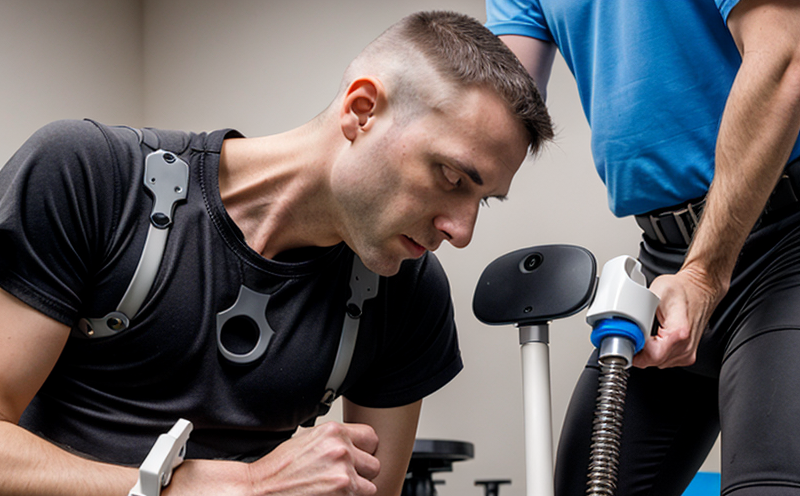ISO 5834-2 Polyethylene Tensile Strength Testing
The ISO 5834-2 standard provides a comprehensive approach to ensuring the quality and safety of polyethylene (PE) used in orthopedic and prosthetic devices. This service specifically focuses on tensile strength testing, which is crucial for assessing the mechanical integrity of materials that will be subjected to stress during use.
During this testing procedure, samples are prepared according to the specific requirements outlined in ISO 5834-2. These may include cutting specimens from raw material or finished parts into standard shapes and dimensions. The tensile test is conducted using a universal testing machine equipped with an appropriate fixture capable of applying controlled loads until failure occurs.
The process involves several key steps:
- Sample preparation: Ensuring the sample meets the specified dimensions and tolerances as per ISO 5834-2.
- Clamping: Properly securing the specimen in the testing machine to prevent slippage or misalignment during loading.
- Loading: Applying a constant rate of extension until rupture, ensuring accurate data collection throughout the test.
- Data analysis: Recording peak loads and strain rates at which failure occurs. This information is then used to determine the tensile strength of the material according to ISO 5834-2 criteria.
Understanding these steps helps our clients ensure they meet regulatory requirements while also gaining insights into how their products perform under stress conditions similar to those encountered in real-world applications.
| Test Parameter | Description |
|---|---|
| Tensile Strength | The maximum average load per unit area before failure. |
| Elastic Modulus (Young's Modulus) | A measure of stiffness indicating the resistance to deformation under stress. |
| Strain Rate | The rate at which strain is applied during testing, influencing how quickly a material fails. |
By adhering strictly to ISO 5834-2 guidelines, we provide reliable and consistent results that can help manufacturers demonstrate compliance with international standards. Our expertise ensures accurate measurement techniques and interpretation of data, providing valuable input for continuous improvement in product design.
We use state-of-the-art equipment calibrated according to best practices recommended by industry leaders like ASTM International and ISO. This guarantees precision and accuracy throughout the testing process, leading to more robust products that meet stringent quality standards.
Applied Standards
The primary standard used in this service is ISO 5834-2:2016, which specifies requirements for polyethylene intended for use in medical devices. This includes various grades of PE such as HDPE (high-density polyethylene), LDPE (low-density polyethylene), and LLDPE (linear low-density polyethylene).
ISO 5834-2 covers multiple aspects including chemical composition, mechanical properties, and biological characteristics of the materials. For tensile strength testing specifically, this standard outlines precise methods for sample preparation, test setup, and data interpretation to ensure consistent results across different laboratories.
Industry Applications
- Bone replacements: Artificial hips, knees, and other joint implants require materials with high tensile strength to withstand the significant forces exerted during movement.
- Trauma care devices: Splints and casts made from PE need to maintain their shape while providing adequate support without compromising flexibility or comfort for patients.
- Orthopedic braces: These must offer sufficient resistance against external pressures yet remain lightweight enough not to impede mobility.
| Sample Preparation | Description |
|---|---|
| Cutting dimensions | Samples are cut into standard lengths and widths specified in ISO 5834-2 to ensure uniformity among specimens. |
| Roundness | The roundness of the sample is checked using specialized tools provided by the client or our laboratory. |
These applications underscore why thorough tensile strength testing according to ISO 5834-2 is essential for ensuring safety and efficacy in medical devices. Properly conducted tests provide critical data needed during product development, manufacturing, and quality assurance processes.
Competitive Advantage and Market Impact
In the highly competitive field of orthopedic and prosthetic devices, meeting rigorous standards like those specified in ISO 5834-2 can give manufacturers a significant edge. Compliance demonstrates commitment to patient safety and satisfaction, which translates into better customer trust.
By offering comprehensive tensile strength testing services tailored specifically for polyethylene materials, we enable our clients to:
- Ensure compliance with international standards.
- Demonstrate product reliability through consistent test results.
- Promote continuous improvement in manufacturing processes based on detailed feedback from each test.
The ability to consistently meet these high standards enhances a company's reputation within the industry, potentially opening doors to new markets and partnerships. Moreover, it reassures regulatory bodies that your products are safe for use by patients worldwide.





